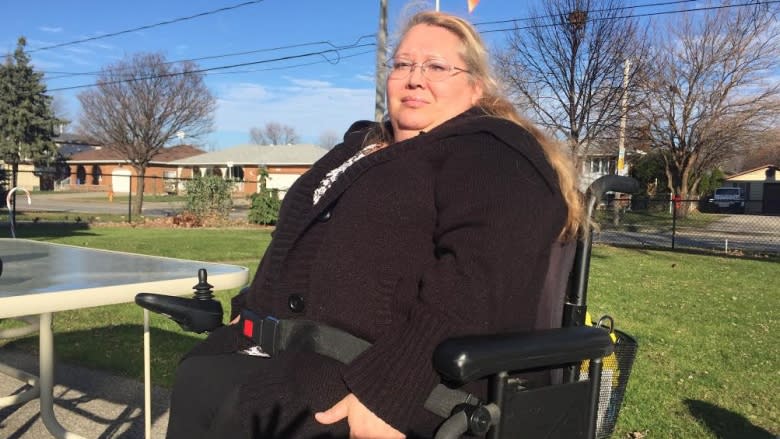Woman in a wheelchair says she was denied Transit Windsor service on stroller-filled bus
The bus is Daphne LaCount's lifeline.
She's been in a wheelchair for the past four years because of a bad hip and arthritis in her back. Without the bus, she wouldn't be able to get to her ceramics class, go to doctor's appointments or socialize.
Last week, the Windsor woman said she was told she couldn't get on a bus because the designated wheelchair spots were taken up by passengers with strollers.
"It'd be different if there were two wheelchairs in the spot," LaCount said. "But with two strollers in the handicap seating? That's not fair. That's not right."
This was the second time LaCount's been denied access to a Windsor bus because there was no room for her wheelchair. She's contacted Transit Windsor, the mayor's office and called 3-1-1.
"It throws the whole day off," LaCount said. "I might not get to my appointment in time. You try paying $50 for a missed appointment, I can't afford that."
She said she wants to see strollers banned from city buses.
Brenda White also uses a wheelchair and needs to take the bus. She said she encounters similar problems with getting home, especially in busy areas near Tecumseh Mall.
"If that disabled bus is filled with able-bodied passengers, I don't get on," she said. "I have to wait another hour for another bus to come by."
Riders using wheelchairs aren't the only ones who say they're left out in the cold.
John Bordilau said his girlfriend had to wait for three buses — an hour and a half wait — before she could get on with a stroller and their 10-month-old baby. The buses were filled with riders using wheelchairs and there was no room for them.
According to Transit Windsor's guidelines, all passengers need to give up their priority seating if a person with a disability comes aboard. People with strollers are encouraged to fold it up.
But it can sometimes be tough for drivers to enforce this policy, said Pat Delmore Transit Windsor's executive director, in an interview with CBC News. He said that's because not all disabilities are easy to see.
"We don't always know if a person has a disability, there are invisible disabilities," Delmore said. "There are requirements for those individuals to be able to access and utilize the same seats perhaps someone in a wheelchair needs as well."
All drivers can do is encourage people to move over when someone who needs a priority seat comes on.
Delmore said 102 out of 112 Transit Windsor buses are wheelchair accessible, with another six on the way in the new year.
Delmore said he "certainly doesn't condone" people using wheelchair seating for strollers but admits the size of strollers is becoming a challenge.
"Gone are the days you and I remember of the umbrella stroller," he said Tuesday on Windsor Morning.
Strollers are now double wide and larger, he said.
"I'm serious, it comes up often," he said of stroller accommodation.
Delmore said even the size of some wheelchairs are becoming too big to properly accommodate.



